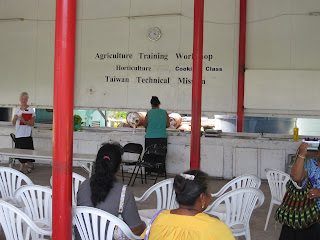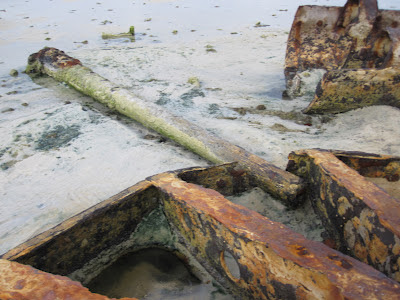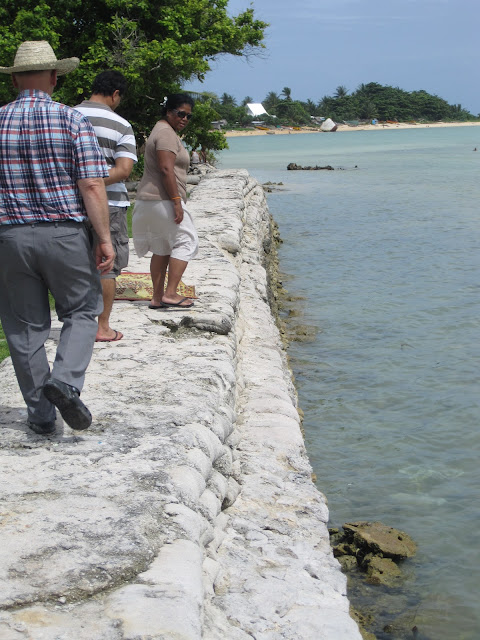Our schedule seems to stay busy. We thought you might like to know what it's like.
We get up each morning between 6 and 6:15 and play tennis with another senior couple, unless it has rained and leaves the court wet. Because we live on campus of Moroni High School, there is one tennis court. However, we are in the rainy season now, and it rains almost every day -- sometimes for just 15 minutes at a time, but may do so several times in a day or night. It can be a heavy rain in a very short time or last for hours.
By 7:00 a.m. we are in our flat, getting breakfast, showering (there is usually water, but sometimes not in the middle of a shower, so we keep 2 liter bottles of water handy.) By 8:00-8:30 we have been on our way to help missionaries with problems in their flats, bank issues, get supplies, etc., which takes us until 1-2:00 or later. We get some lunch and start planning or working with people at the Service Center to get some coordination of vehicles or other services, follow up on repairs at the flats, etc.
The evenings have a variety of meetings. We have been teaching square dances and the Virginia reel on Monday and Tuesday nights, personal finance workshop in Teaoreke (10 miles away) on Wednesday night, music class on Thursday night in Betio (20 miles away), and the past 2 Fridays have attended ward or stake functions. Baptisms on Saturday nights have been happening. On Sundays, we visit 2-3 wards or branches of the church to get to know the members and offer support. Starting at 7:30 a.m., we get home about 3:30 p.m. and take a little nap. Then we fix dinner, read, catch up on email and planning.

We have meetings occasionally with another senior couple to plan, figure out solutions to problems, etc. We have meetings each Saturday with the zone leaders and Elder Bonnemort (a retired IRS administrator, whose wife is the mission nurse.)
We have been trying to get our laundry done on Saturdays, but have found we need to do it about twice a week. We try to hang it on the line in the sun, but since it rains a lot, we sometimes have to put it on lines under the awning on the back of our flat since we have no dryer. The washing machine is outside in a little enclosure and I jumped when I opened the little door and saw what appeared to be a huge spider quickly scamper behind a bag of compost I had there. It was actually a crab, about 7 inches in diameter.
In addition, we work with small groups and individuals in personal improvement ventures. Judy has been meeting with some Kiribati ladies where they share cooking ideas. I have been meeting with a couple of individuals who asked for help in starting businesses because they had no background in financial planning, marketing, accounting or organization for a business. These people are a happy and kind people, with lots of creativity and the ability to pick up dance, singing and crafts quickly, but math and long-range planning are not their strong suits.
Their kindness and politeness are illustrated in the traditions they have of always honoring guests at every function by having us sit right up front for any performance, making sure we get food before anyone else (and sometimes when no food is provided for anyone but the honored guests.) In addition, when working with them to make a request, rather than refuse something (like scheduling a car for checkout on a certain day) they will schedule something even when nothing is available. Rather than ask for clarification when they don't understand, they will just nod or raise their eyebrows (which is one way they say "yes"), so it's sometimes difficult to know when to keep asking or explaining.
Because fresh vegetables are very expensive and often not available, we are trying to raise a garden of our own. We got some compost and "black dirt" and put it in bags or boxes, into which we put some plant starts we got from the Taiwanese technological mission here. The containers help hold the nutrients and water in because the soil is mainly just sand.
These are the tomato plants at the Taiwanese agricultural station, which tries to help the Kiribati people learn to grow more of their own food by getting starts going and then selling them at roadside stands.
July 7, I flew on a small plane with 2 elders and a counselor in the mission presidency to Butaritari to conduct some mission business and do some training with the local people. They treated us like royalty. At most functions in church or community, they like to honor guests with serving them first, providing special things for them.
The landing strip on Butaritari is dirt and grass, but pretty smooth. About 5000 people live on the island. They make their living fishing and harvesting coconut, bananas and papayas. As one of them told me, "Life is easy here." I told him where I come from we have just 4 months to raise our crops and then have to have warm homes for the winter. It's a whole new level of planning that the people here don't need to worry about.
This is the path through the island. It isn't paved, so it actually is better than on Tarawa, where the concrete and asphalt road has deep, sharp potholes. There are only 5-6 trucks and cars on this island.
This is a small maneaba that the church uses for its meetings. Woven mats are placed on the coral gravel to sit on. Everyone takes off their shoes before walking on it because we also sit on it. There is a blue tarp in the middle.
The unit leader, Paulo, is standing on the left. The food is spread before President Maunga, counselor in the mission presidency, and me, who were the honored guests.
The man leaning up against the pole is about 60 and blind. He was baptized just two weeks ago. There were a couple of other recent converts in the group.
About 26 people attended this Saturday morning meeting. About 30 attend church each Sunday, so this was good attendance for us as visiting authorities.
The man on the left is the Young Men's president, along side of Paulo, group leader. The truck was our transport on the island. Here, we were waiting in an old Fanta soda factory that serves now as the airport.
The members on Butaritari were very gracious in sending back several bunches of bananas and a couple of squashes with us. This is the bunch I took to share with the other senior missionaries.

This is a church boat, used to go to near islands. We traveled about 2 hrs to get to Abaiang to do some branch business and to bring in two elders to work in Tarawa. There was more need for 2 of the 4 missionaries on that island to go back to Tarawa, so we loaded them and their suitcases and bicycles on the boat and returned.
Abaiang is a beautiful island north of Tarawa.
This is one of two identical chapels on Abaiang
The saints here had a meal prepared for us, as most do when they know we're coming.
The inside of the chapel is a large meeting area for sacrament meeting. The door at the left leads to the branch president's office. There is a room on the right for other things. The church has a small house about 80 feet from the chapel for the missionaries to live in.
The imatong (white person) is Judy (Sister Bush.) You'll notice her pants are wet past the knees because we have to wade ashore and back out to the boat.
Our life is busy, but really fulfilling getting to know and serve the people and the missionaries here.



















































